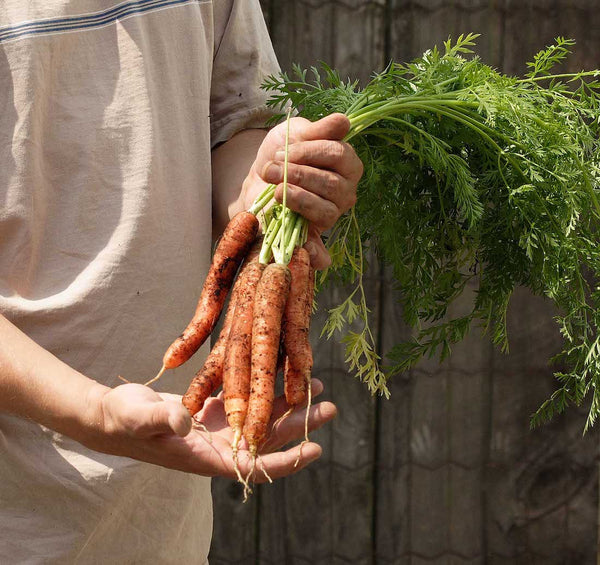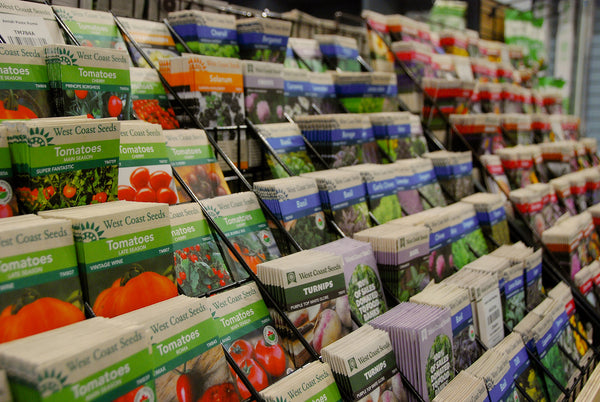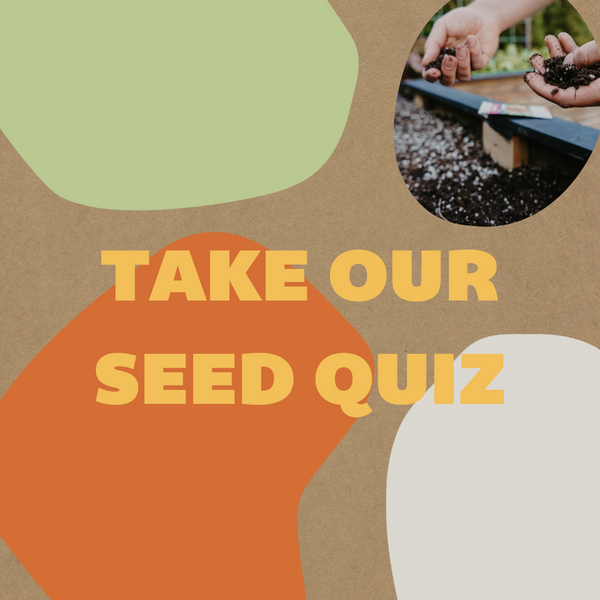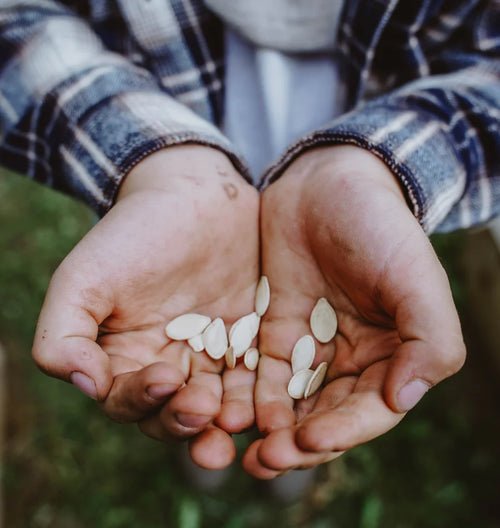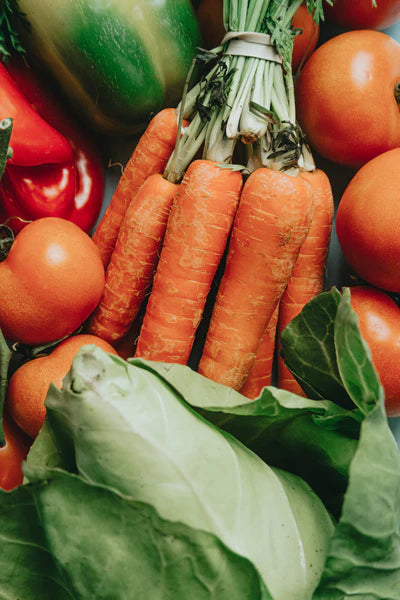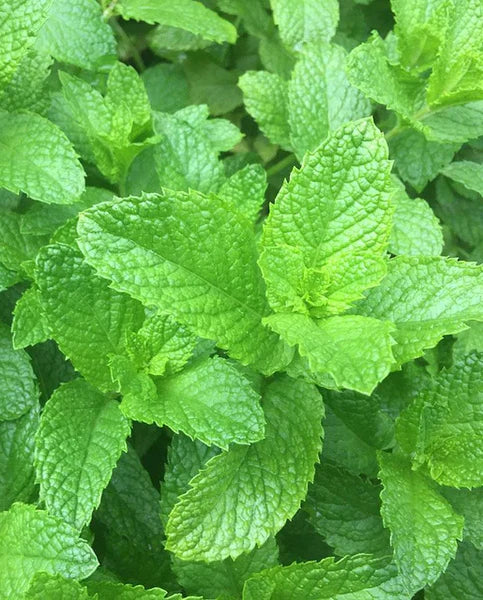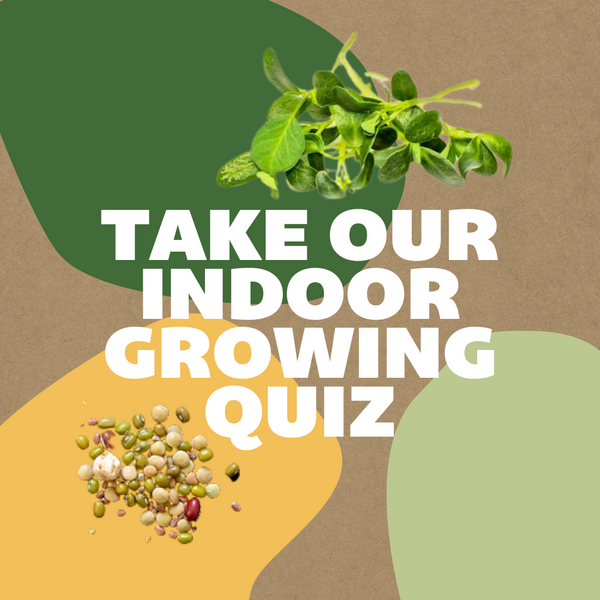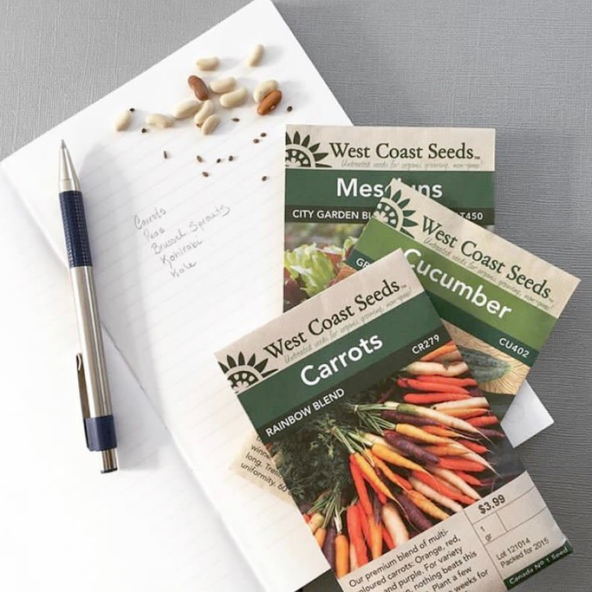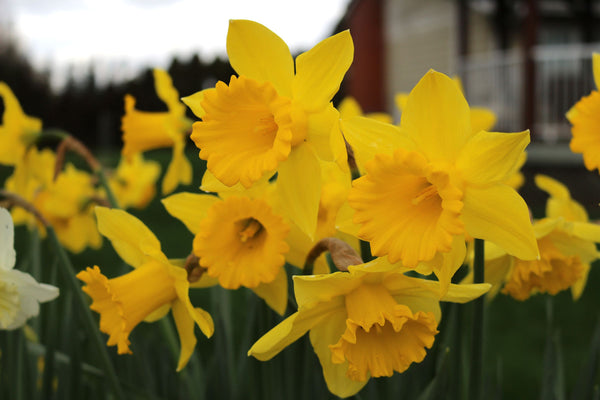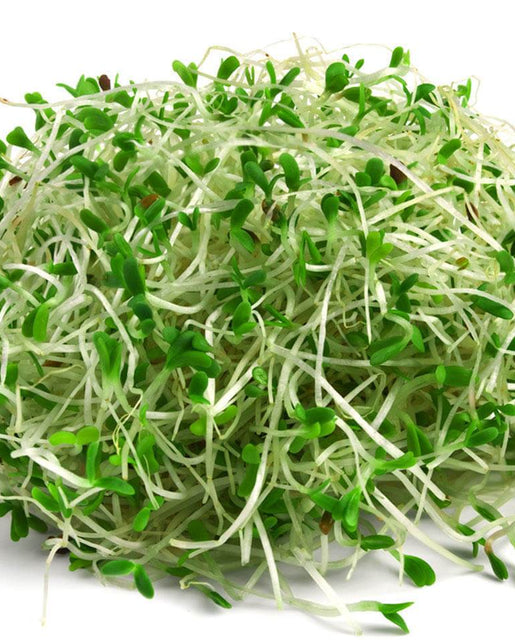West Coast Seeds ships anywhere in North America. However, we are not able to ship garlic, potatoes, asparagus crowns, bulbs, onion sets, Mason bee cocoons, or nematodes outside of Canada. We regret, we cannot accept returns or damages for orders outside of Canada. The minimum shipping charge to the US is $9.99.
FREE SHIPPING ON ORDERS OVER $90 — NOW UNTIL JANUARY 8TH. HAPPY NEW YEAR!
Support Food Banks Canada with every dollar spent — 15% sales donated from Black Friday to Cyber Monday.
Time remaining:
Time remaining:
Seeds
Best Sellers
Supplies
Resources
Company
Seasonal
- All Seeds
- Buttercrunch
- Super Sugar Snap
- Rainbow Blend
- Sweet Million
- Black Beauty
- Patio Snacker
- Nantes Coreless
- Super Gourmet Salad Blend
- Sugar Ann
- Rosemary
- Beet Blend
- Astro Organic
- Cucamelon
- Santo Long Standing
- Bolero
- Peaches and Cream
- Alternative Lawn Blend
- Green Arrow
- Jalapeno M
- Tricolour Bean Blend
- California Wonder
- Ella Organic
- Gold Rush
- Bee Garden Blend
- Sungold
- Dark Green Italian
- Ramrod
- English Thyme
- Celebration
- French Breakfast
- Peppermint
- Early Girl
- Wild Bergamot
- Cylindra
- Forest Green Parsley Seeds
- Desert Organic
- Red Ace
- Aspabroc Broccolini Seeds
- Amazing
- Dukat Dill
- Chives
- Napoli Coated Organic
- Black Krim Organic
- Brocade Marigold
- Borage
- Alderman Tall Telephone
- Manitoba
- Parris Island Cos
- Nautic Coated Organic
- Indigo Rose Organic
- All Vegetable Seeds
- Amaranth Seeds
- Artichoke Seeds
- Arugula Seeds
- Asparagus Crowns
- Asparagus Seeds
- Bean Seeds
- Beet Seeds
- Broccoli Seeds
- Broccoli Raab Seeds
- Brussels Sprouts Seeds
- Cabbage Seeds
- Carrot Seeds
- Cauliflower Seeds
- Celery & Celariac Seeds
- Chicory Seeds
- Collards Seeds
- Corn Seeds
- Corn Salad Seeds
- Cover Crops Seeds
- Cress Seeds
- Cucumber Seeds
- Eggplant Seeds
- Endive Seeds
- Fennel Seeds
- Fruit Seeds
- Gai Lan Seeds
- Hops Rhizomes
- Kale Seeds
- Kohlrabi Seeds
- Leek Seeds
- Lettuce Seeds
- Melon Seeds
- Microgreens Seeds
- Mustards & Asian Greens
- New Zealand Spinach
- Okra Seeds
- Onion Seeds
- Onion Sets
- Pac Choi Seeds
- Parsnip Seeds
- Pea Seeds
- Pepper Seeds
- Potato Seeds
- Pumpkin Seeds
- Radish Seeds
- Rhubarb Seeds
- Rutabaga Seeds
- Salad Mix Seeds
- Seed Garlic
- Seed Potatoes
- Sesame Seeds
- Spinach Seeds
- Sprouting Seeds
- Squash Seeds
- Swiss Chard Seeds
- Tomatillo Seeds
- Tomato Seeds
- Turnip Seeds
- Wild Greens Seeds
- All Herb Seeds
- Basil Seeds
- Bergamot Seeds
- Borage Seeds
- Caraway Seeds
- Catnip Seeds
- Chamomile Seeds
- Chervil Seeds
- Chive Seeds
- Cilantro Seeds
- Comfrey Seeds
- Cumin Seeds
- Dill Seeds
- Epazote Seeds
- Lavender Seeds
- Lemongrass Seeds
- Lemon Balm Seeds
- Liquorice Seeds
- Lovage Seeds
- Marjoram Seeds
- Mexican Tarragon Seeds
- Mint Seeds
- Oregano Seeds
- Parsley Seeds
- Rosemary Seeds
- Sage Seeds
- Savory Seeds
- Shiso Seeds
- Stevia Seeds
- Stinging Nettle Seeds
- Thyme Seeds
- All Flower Seeds
- African Violet Seeds
- Agastache Seeds
- Allium Seeds
- Alyssum Seeds
- Ammi Seeds
- Aster Seeds
- Aurinia Seeds
- Calendula Seeds
- California Poppy Seeds
- Campanula Seeds
- Celosia Seeds
- Cerinthe Seeds
- Clarkia Seeds
- Cleome Seeds
- Collinsia Seeds
- Columbine Seeds
- Coreopsis Seeds
- Cornflower Seeds
- Cosmos Seeds
- Cynoglossum Seeds
- Daisy Seeds
- Delphinium Seeds
- Dianthus Seeds
- Didiscus Seeds
- Echinacea Seeds
- Eryngium Seeds
- Eucalyptus Seeds
- Flax Seeds
- Foxglove Seeds
- Gaillardia Seeds
- Gilia Seeds
- Goji Berry Seeds
- Gomphrena Seeds
- Gypsophila Seeds
- Hollyhocks Seeds
- Iberis Seeds
- Lavatera Seeds
- Lobelia Seeds
- Lunaria Seeds
- Lupin Seeds
- Marigold Seeds
- Milkweed Seeds
- Morning Glory Seeds
- Nasturtium Seeds
- Native Flower Seeds
- Nemophila Seeds
- Nepeta Seeds
- Nicotiana Seeds
- Nigella Seeds
- Oenothera Seeds
- Ornamental Grass Seeds
- Ornamental Kale Seeds
- Pansies & Viola Seeds
- Phacelia Seeds
- Phlox Seeds
- Physalis Seeds
- Poppy Seeds
- Prunella Seeds
- Rudbeckia Seeds
- Salvia Seeds
- Saponaria Seeds
- Scabiosa Seeds
- Sisyrinchium Seeds
- Snapdragon Seeds
- Statice Seeds
- Strawberry Seeds
- Strawflower Seeds
- Stock Seeds
- Sunflower Seeds
- Sweet Pea Seeds
- Tithonia Seeds
- Wildflower Seeds
- Yarrow Seeds
- Zinnia Seeds
- All Cover Crops Seeds
- White Dutch Clover
- Buckwheat
- Crimson Clover
- Sweet Alyssum
- Fall Rye
- Oats
- Winter Field Peas
- Winter Wheat
- Alsike Clover Organic
- Hairy Vetch
- Barley
- Yellow Sweet Clover Organic
- Fava Beans
- Annual Ryegrass Organic
- Winter Field Peas Organic
- Crimson Clover Organic
- Klondike Ladino Clover Organic
- Hairy Vetch Organic
- Perennial Ryegrass Organic
- Fava Beans Organic
- Triticale Organic
- Spring Field Peas Organic
- Barley Organic
- All Microgreens Seeds
- Microgreen Pea Shoots
- Microgreen Sunflower Seeds
- Microgreen Broccoli Organic
- Microgreen Arugula Seeds
- Microgreen Kale Seeds
- Microgreen Beet Seeds
- Two Week Microgreen Seeds
- Three Week Microgreen Seeds
- Microgreen Pac Choi Seeds
- Microgreen Swiss Chard Seeds
- Microgreen Amaranth Seeds
- Microgreen Mustard Seeds
- Microgreen Radish Certified Organic
- Microgreen Kohlrabi Seeds
- Micro Fenugreek Organic
- Microgreen Basil Organic
- All Sprouting
- Alfalfa Sprouting Seeds Organic
- Broccoli Organic
- Wheatgrass Organic
- Mung Beans Organic
- Sandwich Booster Mix Organic
- Red Clover Organic
- Salad Sprouting Seeds Organic
- Fantastic Four Sprouting Collection
- Stainless Steel Sprouting Screen (1)
- Green Peas Organic
- Radish Organic
- Plastic Sprouting Screen/Lid
- Go Go Sprouting Seeds Organic
- Yellow Mustard Organic
- Fenugreek Organic
- Brown Mustard Organic
- Deluxe Sprouting Seeds Blend Organic
- Gourmet Sprouting Seeds Organic
- Sprouting Jar with Metal Lid and Seeds
- Bean Salad Organic
- Green Lentils Organic
- Barley Organic
- Sprouting Jar with Plastic Lid and Seeds
- Stainless Steel Sprouting Ring
- Adzuki Beans Organic
- Green Hunter Organic
- Stainless Steel Sprouting Screen and Ring
- Easy Sprout
- Care Bags
Close
- All Best Sellers
- Buttercrunch - Butterhead Lettuce Seeds
- Super Sugar Snap - From Soil to Soul Collection
- Rainbow Blend - Carrot Seeds
- Sweet Million - Cherry Tomatoes
- Black Beauty - Mind & Soil Collection
- Patio Snacker - Cucumber Seeds
- Nantes Coreless - Carrot Seeds
- Super Gourmet Salad Blend - Lettuce Seeds
- Sugar Ann - Part Shade Food Garden
- Rosemary - Cocktail Garden Collection
- Beet Blend - Beet Seeds
- Astro Organic - Arugula Seeds
Close
- Shop All Supplies
- Bird Seeds & Feeders
- Composting Tools
- Container Gardening
- Crop Protection
- Fertilizers
- Garden Wear
- Gifts and Essentials
- Hand Tools
- Harvest Tools
- Lighting
- Mason Bees
- Mulches
- Pest Controls
- Plant Labels
- Plant Supports
- Seed Sowing Tools
- Seeds Trays, Covers & Plugs
- Soil Amendments
- Soil Blockers
- Soil Testing
- Sprouting Equipment
- Watering
